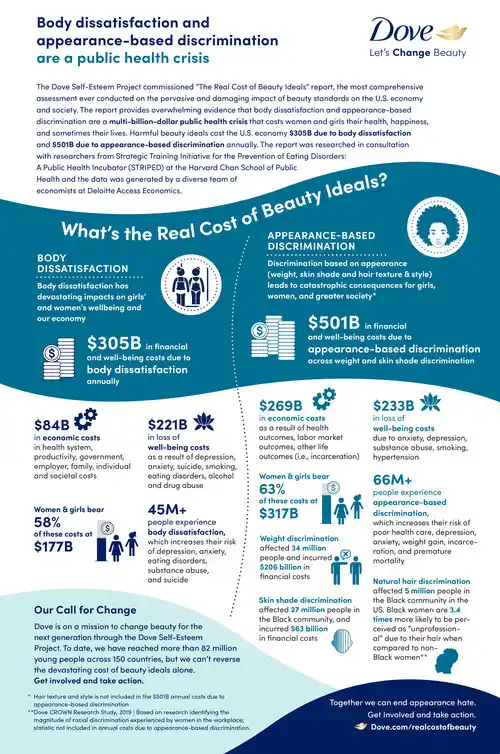Ada daSilva//Getty Images
When you were growing up, it’s likely that if someone had made comments about your appearance, they stayed with you and may have even had negative effects that have lasted a long time. Negative comments are frequently the impetus for seeking change, whether it be as mild as getting a chemical relaxer for your hair or as extreme as invasive surgery to alter your face or body. Even appearance-based “compliments” can be harmful in their own way.
Although it may sound theatrical, these remarks and the bodily standards they seek to enforce are harmful, and we can now put a real dollar amount on how much this all costs.
The “Real Cost of Beauty Ideals” report, which was commissioned by the Dove Self-Esteem Project, examines the effects that beauty standards have on the American economy and society. Its findings are startling. They discovered that these damaging beauty norms, which are frequently unrealistic and unachievable, cost the U.S. economy $305 billion a year in body dissatisfaction and $501 billion a year in discrimination based on looks.
The Real Cost of Beauty Ideals’ report reveals the devastating economic and human toll in the U.S. as a direct result of racist and gendered beauty ideals specifically targeting women and girls

The study was carried out with the consultation of Dr. S. Bryn Austin, Founding Director of the Strategic Training Initiative for the Prevention of Eating Disorders: A Public Health Incubator (STRIPED) at the Harvard Chan School of Public Health and Boston Children’s Hospital, a diverse team of economists at Deloitte Access Economics, as well as an advisory panel of subject matter experts.
It is Simone Cheung’s responsibility to measure what appears to be immeasurable. She has led initiatives to assess the economic and social consequences of things like elder neglect and violence against children as a health economist with Deloitte Access Economics. The establishment of a monetary value for these societal problems solidifies them as such—societal problems, not personal ones—and motivates legislators to enact legislation and disburse funds in accordance.
In light of this, Cheung and S. Bryn Austin, ScD, professor of social and behavioral sciences at the Harvard T.H. Chan School of Public Health, were asked by The Dove Self-Esteem Project if they could estimate the price tag associated with society’s standards of beauty. The study that follows is the first of its sort, and the answer is yes.
“We have known for years how damaging harmful beauty ideals can be to mental health and well-being and how insidious appearance-based discrimination, especially discrimination based on weight and skin shade, can be in undermining opportunities in work, education, and so much more,” says Dr. Austin, who also serves as director of the Strategic Training Initiative for the Prevention of Eating Disorders (STRIPED). “But for the most part, the focus of past research has been on the individuals most affected, not on the impact for society more broadly. And what we have not had until now is a clear picture of the impact of these problems on the US economy.”
Beauty ideals are perceptions of the ideal form of beauty that are socially formed. White standards are reflected in the most widely accepted beauty norms in the United States, which are reaffirmed through media, entertainment, families, and other sociocultural outlets. This has a significant effect on how individuals perceive themselves and those around them.
Toxic beauty ideals have a huge and dangerous toll on people’s lives and careers. For example, body dissatisfaction has been linked to depression, anxiety, suicide, smoking, eating disorders, and alcohol and drug abuse, while discrimination based on appearance has been linked to poor health, weight gain, incarceration, early mortality, and other problems.
The cost incurred to change one’s appearance is obviously only one aspect of the discussion. We must discuss the cost of wellbeing, or the absence of it. More people than the whole population of Canada—more than 45 million people, according to a study by Dove—experience body dissatisfaction. Depression, anxiety, attempted suicides, smoking, eating disorders, and substance misuse all contribute to $221 billion in annual expenditures associated with body dissatisfaction. $206 billion was spent on the expenses of weight discrimination alone, which affected 34 million people.
It goes without saying that natural hair discrimination is a part of appearance-based prejudice; according to the Dove survey, Black women are 3.4 times more likely than non-Black women to be viewed as “unprofessional” because of their hair.
This survey should serve as a major wake-up call. Although we are all aware of the power of compassion and the necessity of speaking wisely, there is still more we can and ought to do. We can back anti-discrimination laws as well. Start by calling your senator and requesting that they ratify The Crown Act, which outlaws hair discrimination in the workplace on a national level – currently permitted in 49 states. Only 18 states have approved the CROWN Act, which outlaws discrimination based on hairstyle and texture.
“The numbers demonstrate the urgent need for action, and that this needs to be a multi-pronged, multi-sector approach,” says Cheung. “Everyone has a role to play in addressing the underlying forces that promote and propagate harmful beauty ideals – including researchers, employers, individuals, family and friends, government, health and education providers and industry and media.”
Then there are the things you can do in your day-to-day activities to ensure that the people in your immediate vicinity feel beautiful and loved, including giving them sincere compliments. Dove also provides a free “Confidence Kit” to aid kids in fostering their sense of self-worth.
Naturally, this is only the beginning. Every day, we should all be working toward a better future when neither we nor those around us feel the need to alter any aspects of who we are or who they are to conform to a false definition of beautiful.

